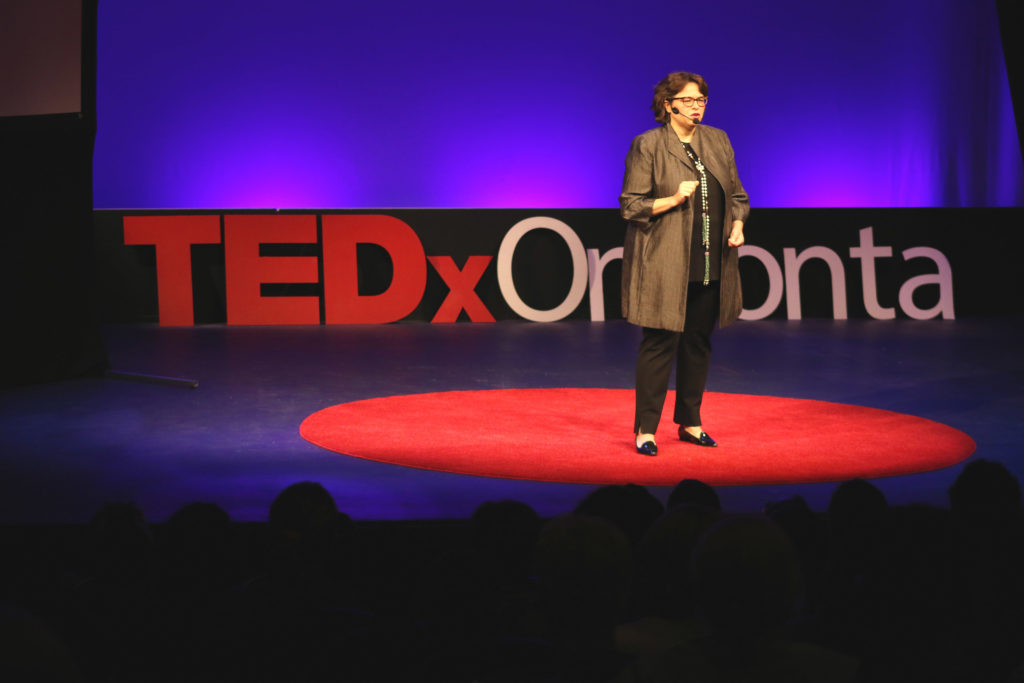TEDx Speaker Says: Save Our Farms
With Water, Upstate
Can Save The World
By JENNIFER HILL • Special to www.AllOTSEGO.com

ONEONTA – America will face a food security crisis within 20 years and Upstate New York is the solution.
That’s the message Phoebe Schreiner, executive director of the Oneonta-based Center for Agriculture Development & Entrepreneurship (CADE) brought to the third TEDxOneonta Talk Friday, Sept. 13, at Hartwick College.
“I saw the impact of climate change the desertification of agriculture in the rural areas of India and Afghanistan,” said Schreiner, who worked in economic development worldwide for 21 years.
“And when I moved back to my family’s farm in Schoharie County, I saw how lush it was, how much water we have…at the same that our farms are going bankrupt.”
At the same time, national climate experts believe California and the Midwest, the regions that today produce the large majority of America’s fruits, vegetables and grains, “are in trouble.”
“With the increases in temperature and wildfires, there will be negative crop yields. The U.S. population will increase by 110 million people in the next 30 years,” said Schreiner. “And the U.S. can’t sustain those levels.”
For New York State, though, “climate models project better agricultural conditions,” especially because “water will continue to be abundant and is the most vital ingredient.” The state is both close to and contains a core of large populations.
But to become America’s “new foodshed,” New York will have to reverse farming’s decline and become a vibrant, large-scale industry. Schreiner gave “a seven-step path” for achieving that goal:
1) Farm aggregation, which means farms banding together to share markets and profits. Schreiner said her friend Ken Jaffe’s Slope Farms in Meredith will sell his neighbors’ produce and give them a fair price.
2) Increase arable land producers. “The average age of farmers is 59, and young people interested in farming, are drowning in student debt,” Schreiner said. “New farmers need student loan debt forgiveness.”
3) Do more research on market forces for scaling up production.
4) Use Holland as a model for massive indoor farming, since New York State’s growing season is short.
5) Close gaps in the food supply chain, such as ensuring enough affordable trucking to get produce to markets. Use “big data” to drive strategic planning and investment.
6) Use public and private investment in New York State agricultural policy.
7) Prepare for climate adaptation to keep our food resilient. Examples are good stormwater management and prevention of soil erosion.
The four other speakers ranged from economic development to relationship development.
Choking back tears, Gertrude Matshe-Kanicki, a Zimbabwean living in New Zealand, said, “Africans were told a lie, that we were poor, and we believed it. The only missing piece in Africa is education.”
An entrepreneur and business coach, Cait Scudder, said three roadblocks prevent people from tapping an inner genius: “People fear failure, success, and disappointing others. In creating success, you have to be bad at things and work through them so you get better. You have to keep going.”
Abby Metcalf, who has spent 30 years helping “thousands of people” with their relationships, said if people take sides, they are making their relationships into competitions. “You have to give 100 percent of yourself,” she said.
Matt Episcopo, a police officer who received the Medal of Honor, coached the audience in building self-confidence through three phrases.
“I’m cool! I’m calm! And I’m great!” the 200-plus crowd chanted.

